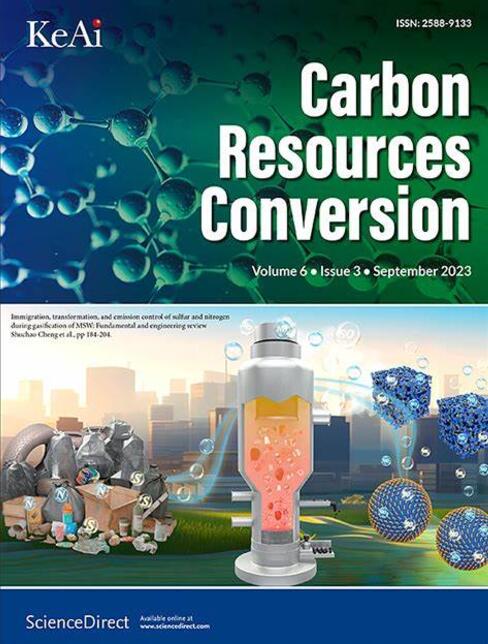Isotope-tagging atmosphere to characterize carbonate ore decomposition reaction in carbon dioxide
IF 7.5
3区 环境科学与生态学
Q2 ENERGY & FUELS
引用次数: 0
Abstract
This study utilizes a combination of micro fluidized bed analysis technology and isotope-tagging methodology to investigate the decomposition of carbonate ores in CO2 atmospheres. Utilizing the decomposition of magnesite in an atmosphere containing 13CO2 as a case study, the reaction behavior and kinetics were investigated using a micro fluidized bed reaction analyzer (MFBRA). The results reveal that 13CO2 in the atmosphere hinders the decomposition process, thereby increasing the time required for complete decomposition. The activation energy was observed to increase with the concentration of 13CO2 in the reaction atmosphere. Compared to the results obtained from thermogravimetric analysis (TG), the activation energy and pre-exponential factor values determined by the MFBRA are lower. Due to the excessive suppression caused by the accumulation of product gas within the sample crucible, the apparent activation energy calculated based on TG data was overestimated, particularly in atmospheres containing the product gas CO2. The MFBRA, operating in an environment characterized by essentially eliminated external gas diffusion, extensive gas–solid mixing, and high rates of mass and heat transfer, has proven to be highly capable of accurately determining the kinetics of carbonate ore decomposition in CO2-rich atmospheres. This study provides a straightforward and reliable method for elucidating the reaction characteristics and kinetics of carbonate ore decomposition in atmosphere of CO2.

碳酸盐岩矿石在二氧化碳中分解反应的同位素标记气氛表征
本研究将微流化床分析技术与同位素标记方法相结合,对碳酸盐岩矿石在CO2大气中的分解进行了研究。以菱镁矿在13CO2气氛下的分解为例,利用微流化床反应分析仪(MFBRA)研究了菱镁矿的反应行为和动力学。结果表明,大气中的13CO2阻碍了分解过程,从而增加了完全分解所需的时间。反应气氛中13CO2浓度越大,反应活化能越高。与热重分析(TG)结果相比,MFBRA测定的活化能和指前因子值较低。由于产物气体在试样坩埚内的积累造成了过度抑制,基于热重数据计算的表观活化能被高估了,特别是在含有产物气体CO2的气氛中。MFBRA在基本消除外部气体扩散、广泛的气固混合、高质量和热传递率的环境中工作,已被证明能够准确测定富二氧化碳大气中碳酸盐矿石分解动力学。本研究为阐明碳酸盐岩矿石在CO2气氛中的分解反应特征和动力学提供了一种简单可靠的方法。
本文章由计算机程序翻译,如有差异,请以英文原文为准。
求助全文
约1分钟内获得全文
求助全文
来源期刊

Carbon Resources Conversion
Materials Science-Materials Science (miscellaneous)
CiteScore
9.90
自引率
11.70%
发文量
36
审稿时长
10 weeks
期刊介绍:
Carbon Resources Conversion (CRC) publishes fundamental studies and industrial developments regarding relevant technologies aiming for the clean, efficient, value-added, and low-carbon utilization of carbon-containing resources as fuel for energy and as feedstock for materials or chemicals from, for example, fossil fuels, biomass, syngas, CO2, hydrocarbons, and organic wastes via physical, thermal, chemical, biological, and other technical methods. CRC also publishes scientific and engineering studies on resource characterization and pretreatment, carbon material innovation and production, clean technologies related to carbon resource conversion and utilization, and various process-supporting technologies, including on-line or off-line measurement and monitoring, modeling, simulations focused on safe and efficient process operation and control, and process and equipment optimization.
 求助内容:
求助内容: 应助结果提醒方式:
应助结果提醒方式:


